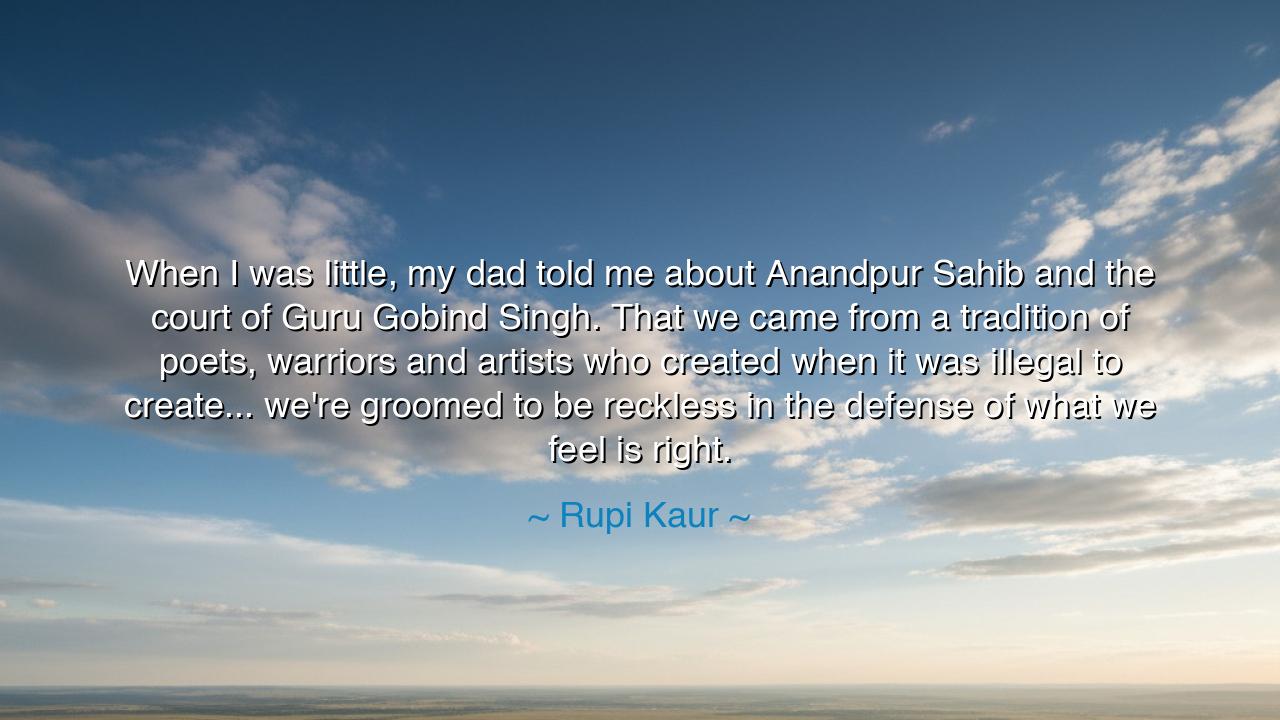
When I was little, my dad told me about Anandpur Sahib and the
When I was little, my dad told me about Anandpur Sahib and the court of Guru Gobind Singh. That we came from a tradition of poets, warriors and artists who created when it was illegal to create... we're groomed to be reckless in the defense of what we feel is right.






In a voice woven from reverence and remembrance, the poet Rupi Kaur once said: “When I was little, my dad told me about Anandpur Sahib and the court of Guru Gobind Singh. That we came from a tradition of poets, warriors and artists who created when it was illegal to create... we're groomed to be reckless in the defense of what we feel is right.” In these words, she does not merely recall a childhood lesson — she calls upon a lineage of courage, a heritage carved from both blood and ink. It is a remembrance of what it means to be Sikh, and more deeply, what it means to be human: to stand in the face of oppression and still create beauty, to wield both the sword and the pen, and to defend truth even when the world commands silence.
The origin of this quote lies in the sacred history of Anandpur Sahib, a city founded by the tenth Sikh Guru, Guru Gobind Singh, in the late seventeenth century. It was not merely a fortress of defense, but a sanctuary of art, poetry, music, and spirit. There, under the Guru’s guidance, poets and scholars gathered to compose verses that celebrated the divine, the heroic, and the just. Yet they did so in a time of tyranny, when to speak truth or sing freedom was to invite death. The Mughal Empire, fearing the awakening of such voices, sought to silence them. But in the court of Anandpur, creativity itself became an act of rebellion — an assertion that truth cannot be chained, and that art is a weapon sharper than any blade.
When Kaur recalls that she descends from “poets, warriors, and artists who created when it was illegal to create,” she invokes this spirit of sacred defiance. Her father’s teaching was not simply of history, but of identity — of a heritage that unites courage and creation, resistance and reverence. To be part of such a lineage, she suggests, is to live with fearless purpose, to understand that self-expression is not indulgence, but duty. The word “reckless,” as she uses it, does not mean careless, but bold beyond fear, a willingness to act for what is right even when the world turns hostile.
The ancients, too, understood this truth. Across time, those who spoke truth to power — the prophets, the philosophers, the poets — all risked their lives to keep the flame of conscience alive. Think of Socrates, who chose death rather than betray his search for wisdom; or Mirabai, the saint-poet of India, who sang of divine love when society demanded silence; or the Bhagats whose hymns grace the Sikh scripture, the Guru Granth Sahib, composed in defiance of caste and tyranny. Like Kaur’s ancestors, they too were “artists who created when it was illegal to create,” for they knew that to create truth is to challenge every falsehood that seeks to rule the soul.
The court of Guru Gobind Singh was the living embodiment of this principle — a union of the spiritual and the martial, where poetry was sung before battle, and warriors were taught that valor without compassion was hollow. He himself was a poet of great power, writing verses that stirred the hearts of his people and reminded them that the pen and the sword are one when guided by righteousness. To be “groomed to be reckless,” in this tradition, was to be trained in both self-discipline and defiance, to live by the code of miri-piri — the balance of temporal power and spiritual grace.
Rupi Kaur’s words are therefore not merely personal; they are ancestral, carrying forward a legacy of resistance through creation. In her poetry, she continues the work of those who came before her — using language as a tool of liberation, reclaiming voice for women, for immigrants, for the silenced. In her father’s lesson, she found her calling: to create even when the world forbids it, to speak when silence is expected, and to stand unflinching for truth. This is the inheritance she honors — not wealth or bloodline, but a spiritual lineage of fearless expression.
The lesson, then, is clear and timeless: creation is a sacred act of courage, and truth demands defenders who are both tender and fierce. We, too, must learn to be “reckless in the defense of what we feel is right” — not with violence, but with conviction. When injustice rises, speak. When art is censored, create. When compassion is mocked, live it louder. For each act of creation born in defiance strengthens the soul of humanity.
So remember, my children of the future: as Rupi Kaur teaches, you are heirs to more than comfort — you are heirs to the courage of poets, the strength of warriors, and the tenderness of artists. Let your voice be your sword, your compassion your armor, your art your rebellion. For in every age, the world will try to silence those who create — and in every age, it is those who dare to create that keep the world alive.






AAdministratorAdministrator
Welcome, honored guests. Please leave a comment, we will respond soon